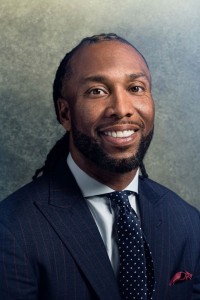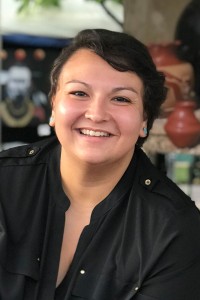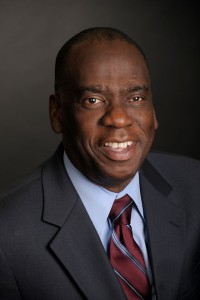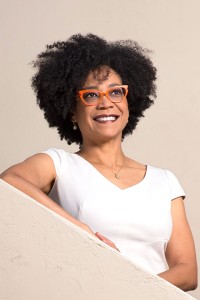2024 Honorees
The Larry Fitzgerald Foundation
ASU MLK Community Servant-Leadership Award recipient

For nearly two decades, The Larry Fitzgerald Foundation has worked to provide equitable access and new pathways for success for underrepresented communities both nationally and internationally. Providing children with the tools they need to feel confident and supporting women, men and families affected by breast cancer is deeply rooted in their mission.
Their directive is to do their part in providing access where it is needed the most. Creating opportunities for young people to thrive in safe and healthy environments where they can reach their full potential is of the utmost priority. Additionally, recognizing the impact breast cancer has on underserved communities and the lack of resources available has created an ongoing need they feel obligated to fulfill.
Established in 2005, their Founder, Larry Fitzgerald Jr., made the work of the foundation a pillar of his existence after losing his mother to breast cancer in 2003. Larry’s mother, Carol, was the exemplar of community service and advocacy work. She was instrumental in his life and in the lives of community members who suffered from breast cancer.
Through the foundation, Fitzgerald continues to expand his philanthropic endeavors as he fosters relationships with corporate partners committed to advancement in the areas of education and technology by donating significant resources and digital devices to schools and programs in Arizona, Minnesota and across the country. Beyond the foundation’s core mission of breast cancer awareness and youth education, his philanthropic initiatives range in size and scope, from economic development projects in Senegal and Ethiopia, to delivering hearing technology in Africa and Southeast Asia.
Jamelyn Ebelacker
ASU MLK Student Servant-Leadership Award recipient

With a diverse educational background and a track record of community service, Jamelyn Ebelacker is an exceptional student who embodies the principles of servant-leadership. She is currently pursuing a Master of Business Administration with a focus on Consulting, Marketing, and Sustainability at Arizona State University, where she serves as president of the MBA association. She describes the ASU community as a place for voices to be amplified and values the sense of power she has found within her programs.
Her dedication to leadership extends beyond formal roles, as she has actively engaged in community service and cultural consultation through honorable outlets such as the Peace Corps, where she served as Volunteer leader to improve literacy rates in Saint Lucia. Her unwavering dedication to the Peace Corps is seen through her impact on the communities she served as well as her nomination for the Franklin H. Williams Award for Exemplary Service.
Her role as Cultural Consultant & Project Manager at Indigenous Direction has exemplified her dedication to cultural awareness and representation in a broader nationwide context as she actively fostered collaboration between Macy’s Entertainment Group and Indigenous communities to promote cultural inclusivity for the renowned Macy’s Thanksgiving Day Parade.
Ebelacker’s dedication to a service-first approach is evident in her career choices and community involvement. She has actively chosen roles that allow her to serve and make a positive impact with the mission of becoming a good ancestor as those before her have. Upon graduating from ASU, Ebelacker has a powerful vision to channel her knowledge and experience back to her tribal community, Santa Clara Pueblo in northern New Mexico.
Dr. Jeffrey R. Wilson
ASU MLK Faculty Servant-Leadership Award recipient

Dr. Jeffrey R. Wilson’s commitment to the Sun Devil Community is more than apparent. As an advocate for justice, diversity, equity and inclusion at the W. P. Carey School of Business, his impact is clearly seen through his teaching and research.
Wilson’s reach extends outside of the classroom and onto the playing field as the ASU faculty representative for the Pac-12 and also as a longtime member and past chair of the Sun Devil Athletics board. Wilson is a former chair of the Gender, Diversity, and Student Well-being subcommittee for the National Collegiate Athletic Association (NCAA), proving his advocation and passionate support for student-athlete rights.
Dr. Wilson’s research experience includes grants as Pl and co-Pl from the NIH, NSF, USDA, Arizona Department of Health Services and the Arizona Disease Research Commission. He has published more than 80 articles in leading journals such as Statistics in Medicine, American Journal of Public Health, Journal of Business and Economic Statistics and Australian Journal of Statistics, among others. He has consulted with pharmaceutical companies and hospitals while representing them before the FDA and other federal government healthcare agencies.
Dr. Wilson has also served as an expert witness in legal cases concerning construction defects, sampling, insurance, patient billing, job discrimination, profiling, shoplifting, and cheating allegations on law school exams. He has worked with attorney general offices in Minneapolis, Flagstaff and Phoenix on racial profiling.
Besides his already impressive and extensive experience in biomedical, statistics and law, business management and public opinion research, he has also co-authored a book with Katherine E. Irimata and Brittany N. Dugger titled “Fundamental Statistical Methods for Analysis of Alzheimer’s and Other Neurodegenerative Diseases.”
Dr. Wilson continues to make the Sun Devil Community proud. “I love my teaching, my research, and the ASU Community. People ask me what I’m going to do when I retire. In my view, I’m already retired. I love what I do.”
Ladies, Gentlemen, Deans. and honored guests and fellow awardees!
I am honored to have this distinction bestowed upon me. But I am certainly not worthy to have an MLK award!
I feel unworthy as Dr. King was prepared to give up his life; while I was scared during my tenure years; I would not always stand up to the department chair, or the Dean or the Provost as I was afraid that I would not get tenured.
He was prepared to go to jail! while I am afraid to stand up for what I thought is right at times, as I was afraid that the Dean or the Provost would arrange for me to teach classes in Alaska, although we have no campus there nor did we have plans to have students or classes in Alaska.
He was prepared to lead a group on a march across Montgomery while I am scared to stand in front of Old Main or walk from the Business school to the Union and talk against prejudice and injustice openly. I am NOT worthy.
How do I know that I am not worthy? Listen to the history of things done by our last 3-university presidents during my tenure.
In 1985, President Nelson the 14th President brought me here while he planted the roots to stand up against prejudice and injustice. What did I do? Did I march, no! Could I have done more to help President Nelson? We always could do more!
In 1989, President Coor the 15th president bestowed tenure upon me while he planted the trunk on the roots to advance research, cultural diversity, and economics. What did I do? Did I go to jail, no! Could I have done more, we always can do more.
In 2002, President Crow the 16th president made me a full professor and presented me with Faculty Service Achievement Award on Founders’ day while he put branches and leaves on the trunk on the roots of the tree culminating with the LIFT Initiative. He went beyond any of the other 15 presidents! What did I do? Did I march, go to jail or prepared to give my life, hell, no! Could I have done more, we can always do more
So, you see, I did not march, I did not go to jail. I did not offer my life as a sacrifice! So, I feel so unworthy when put in the same sentence with Dr. MLK Jr.
Well as unworthy as I feel today, I want to challenge you to help me, help the university, help the community and the state of Arizona to foster the roots, the branches, and the leaves as a tree where we stand together for Inclusive Excellence; do not be afraid to take a stand; be involve in a virtual march and now and again block a virtual bullet and someday just someday we will all look back and feel worthy that we had the chance to do more and we did.
Once again, I humbly accept this award, still knowing I did not do as much as I can.
My sincere Thanks!
Dr. Kenja Hassan
ASU MLK Staff Servant-Leadership Award recipient
 Photo by Claudia Johnstone
Photo by Claudia Johnstone
Dr. Kenja Hassan began her relationship with ASU in 1997 as a graduate student and became a full-time employee in 2001. Today, she serves as the assistant vice president of cultural relations in the Office of Government and Community Engagement. Hassan is the second senior fellow at the ASU Foundation.
After previous work with the foundation, Hassan hopes to utilize the groundwork laid last year by the inaugural senior fellow as a springboard to move forward in strengthening the connection between the foundation, and leadership members of the university.
Dr. Hassan’s expansion of that work.with the introduction of Black Philanthropy Month, will include highlighting programs that are specific to different cultural and historical groups. Her focus is on using the fellowship as an opportunity to bring attention to other existing heritage celebrations while expanding attendance and contributions in support of those programs.
Hassan expands support for and awareness of the LIFT Initiative through her fellowship focus. LIFT (Listen, Invest, Facilitate, Teach) was conceived as a university-wide effort to implement 25 action items designed to increase growth and opportunities for Black faculty, staff and students at ASU.
Additionally, she wants to alter the narrative surrounding philanthropy in the ASU community toward inclusivity and cultivate a mindset that encourages everyone to give back. Part of this goal is to evolve what it means to be a philanthropist and work toward finding creative ways of participating in giving beyond monetary donations.
To the MLK committee, thank you! I feel honored beyond words. As you know, ASU has been my bread and butter for more than 20 years and into it, I have poured my heart and soul, in hopes of creating a mortar that would bind together the human bricks of our Beloved Community. I do all that I can to help build a history of unity here.
To most important people in the room today, the young essayists and artists: How many of you have a sports team that you love? How many of you have a sports team that you love to HATE? Clearly, I love my Sun Devils and they tell me I’m supposed to hate the Wildcats! Human beings LOVE to have someone to hate. This is all great when it’s for sports or friendly competition, but when it rises to the level of harm, of bullying, of making people work without paying them well, of leaving people out on the streets to starve, or without medical care, or to start a war, then hatred crosses over into evil. That is what Dr. King fought against and that is what he died for.
Sometimes we have to make laws to prevent people from acting on their worst hatreds and to ensure that the people who are the object of hate, can still have an opportunity for a good life. This year is so important because 2024 marks the 60th anniversary of Dr. King’s visit to Arizona. Here, he championed the enactment of the 1964 Civil Rights Act. It was the year after President Kennedy, who shared many of King’s views, was killed. The 1964 Civil Rights Act called for the end of discrimination based on race, color, religion, sex, and national origin, all of the things that people use to generate hate and divide one person from the other.
Hatred against Black people ran deep in the U.S. In the first half of the 1900s, many cities built beautiful, large, public swimming pools with taxpayer dollars so that citizens could have an enjoyable way to stay healthy. Many of them excluded Black people because they thought they would contaminate the pools with dirt and disease. Black people argued that as taxpayers they should be allowed in. When Federal courts ordered local governments to allow Black people to swim in the pools, many of them chose to close the pools instead.
Something similar happened when public schools that had been for white students only were ordered to allow Black students to attend. School districts in Virginia, for example, closed schools entirely for four years rather than admit Black students.
Here in Tempe, for example, hatred against people who were not white was so deep that it was nearly impossible to buy a house here if you were Black, Mexican, Chinese, Japanese, Indian or Native American. [All of these groups were barred from buying or renting homes through racial covenants in property deeds throughout Tempe and many other Valley cities.
My father is white and grew up in an entirely white community. He loved Jazz music and he loved my mother. When he got married to her, it was still against the law in many states for different races to get married to each other. This was before the famous anti-miscegenation case called Loving v. Virginia. That’s a big word I just said. Miscegenation means mixing of races.
Many people hated the idea of races mixing. My grandmother refused to accept the marriage. In fact, she sent a letter to my father stating that because of his decision, he could no longer be part of the family.
When my sister and I were little babies, my parents bundled us up for the five hour drive from our home to our grandparents’ home without telling them. Surprise! Here are your first grandchildren! Luckily, we were pretty cute. We melted their hearts and we spent every summer with them as kids. When I became a teenager, I traveled the world as an exchange student and sent them pictures and stories of people from many different nationalities and countries who delighted in meeting their Mulatto, mixed-race, granddaughter. My sister and I opened their eyes to the possibility of global human acceptance.
That hatred my grandmother directed to my parents hurt my mother, but it also hurt her. One of the last things she was able to express in her dying days at 98 years old was remorse for her views 50 years before. As Dr. King said, “hate is too great a burden to bear.
It was the impact of this hatred King wanted to change through laws. The 1964 civil rights act ushered in a new era of equality and served as a catalyst for several pivotal laws to come after. These laws included protecting the right to vote, equitable access to housing and education, expanded immigration opportunities from Asia and other previously excluded regions, more rights for Native Americans and Tribal Nations, and comprehensive protections for individuals with disabilities.
Dr. King said: “Hatred darkens life; love illuminates it.” You, young ones, our student contest winners, are already influencers. Now, see yourselves as the inspiration you are. Be illuminators who build history through love.
